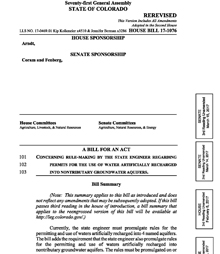By Ralf Topper
 HB 17-1076 is currently making its way through the legislative process having passed the House and the Senate. This legislation, concerning rulemaking for artificial recharge of nontributary aquifers, opens the door for opportunities to implement aquifer storage and recovery programs in nontributary aquifers outside of the Denver Basin. Nontributary groundwater, as defined in Colorado Revised Statute 37-90-103 (10.5), is groundwater whose connection to any surface stream is so insignificant that it is considered isolated from the surface water for water rights administration purposes.
HB 17-1076 is currently making its way through the legislative process having passed the House and the Senate. This legislation, concerning rulemaking for artificial recharge of nontributary aquifers, opens the door for opportunities to implement aquifer storage and recovery programs in nontributary aquifers outside of the Denver Basin. Nontributary groundwater, as defined in Colorado Revised Statute 37-90-103 (10.5), is groundwater whose connection to any surface stream is so insignificant that it is considered isolated from the surface water for water rights administration purposes.
HB 17-1076 is a first step in creating some administrative certainty and legal framework for districts in other parts of the state to consider implementing aquifer recharge and recovery projects to meet their water management objectives, and should be endorsed by the water community. The bill’s use of the term “artificial recharge” is unfortunate, as the use of that term is dated in scientific and engineering literature though still used in reference to older studies and legislation herein. Aquifer storage and recovery (ASR) is designed to introduce water into and store water in underlying aquifers with a future extraction component when additional supplies are needed. ASR is typically implemented through wells.
Increasing storage is an integral theme of Colorado’s Water Plan, published in 2015, and aquifer storage and recovery opportunities dominate the plan’s discussion regarding groundwater. Subsurface water storage in aquifers can significantly reduce the financial, permitting, environmental, security, and socioeconomic hurdles associated with construction of new surface-water reservoirs.
In 1995, the State Engineer promulgated rules and regulations for the permitting and use of waters artificially recharged into the Denver Basin aquifers. The Denver Basin is the only aquifer system in Colorado with specific rules regulating the recharge and extraction of non-native water for storage purposes and as such is currently the only area in Colorado with active ASR projects. The promulgation of those rules has provided both opportunity and certainty for water districts to implement subsurface water storage projects.
- Centennial Water and Sanitation District started ASR operations in 1994 and currently has 25 wells permitted and equipped to inject water into Denver, Arapahoe, and Laramie-Fox Hills aquifers. Through 2014, they have stored over 14,000 acre-feet of potable water.
- Others districts that have implemented ASR operations include Consolidated Mutual, Colorado Springs Utilities, and Castle Pines Metropolitan.
- East Cherry Creek is currently in the testing phase and implementation plans are moving forward in Castle Rock, Meridian, Rangeview, Inverness, and Cottonwood.
- Denver Water has initiated a significant evaluation program and South Metro Water Supply Authority considers ASR a critical component of utilizing water supplies from the WISE partnership.
Subsurface water storage opportunities in bedrock aquifers in other portions of Colorado have been well documented. In 2003, the Colorado Geological Survey produced a statewide assessment of subsurface storage potential opportunities for then-director of Colorado’s Department of Natural Resources Greg Walcher. Published as Environmental Geology Series 13, that study identified 29 priority regional consolidated bedrock aquifers with potential storage capacities from 10’s of thousands to over a million acre-feet. In 2006, Senate Bill 06-193 directed the Colorado Water Conservation Board to conduct an underground water storage study in the South Platte and Arkansas River basins. That study identified a number of areas for potential underground water storage in both basins with available storage capacities of tens to hundreds of thousands of acre-feet in most areas.
 Ralf Topper has recently retired with 16 years of service as the senior hydrogeologist in both the Colorado Division of Water Resources and the Colorado Geological Survey. He has earned advanced degrees in Geology (BS, MS) and Hydrogeology (MS) from CU-Boulder and Colorado School of Mines, and has over 35 years of professional geoscience experience in both the private and public sectors. He is a Certified Professional Geologist, a Geological Society of America Fellow, and an active member of both national and state groundwater societies. Ralf has authored numerous papers and publications on Colorado’s groundwater resources including the award-winning Ground Water Atlas of Colorado.
Ralf Topper has recently retired with 16 years of service as the senior hydrogeologist in both the Colorado Division of Water Resources and the Colorado Geological Survey. He has earned advanced degrees in Geology (BS, MS) and Hydrogeology (MS) from CU-Boulder and Colorado School of Mines, and has over 35 years of professional geoscience experience in both the private and public sectors. He is a Certified Professional Geologist, a Geological Society of America Fellow, and an active member of both national and state groundwater societies. Ralf has authored numerous papers and publications on Colorado’s groundwater resources including the award-winning Ground Water Atlas of Colorado.

 Print
Print
Reblogged this on Coyote Gulch.